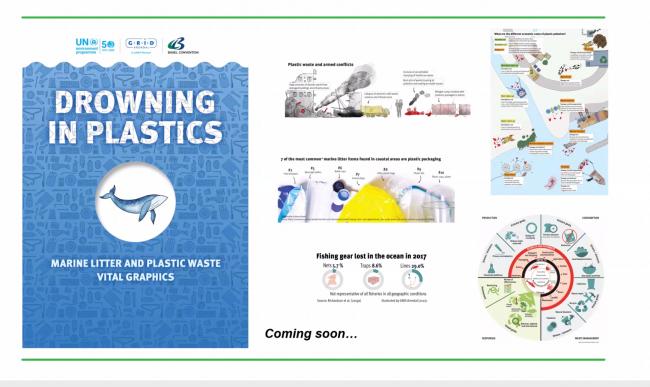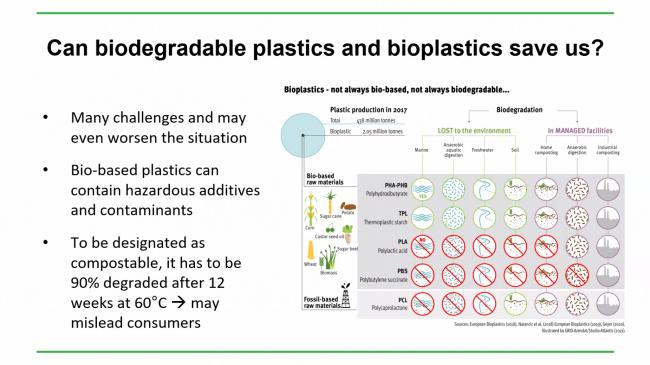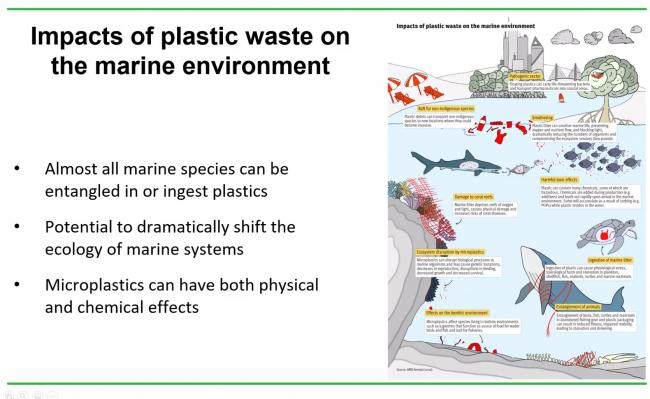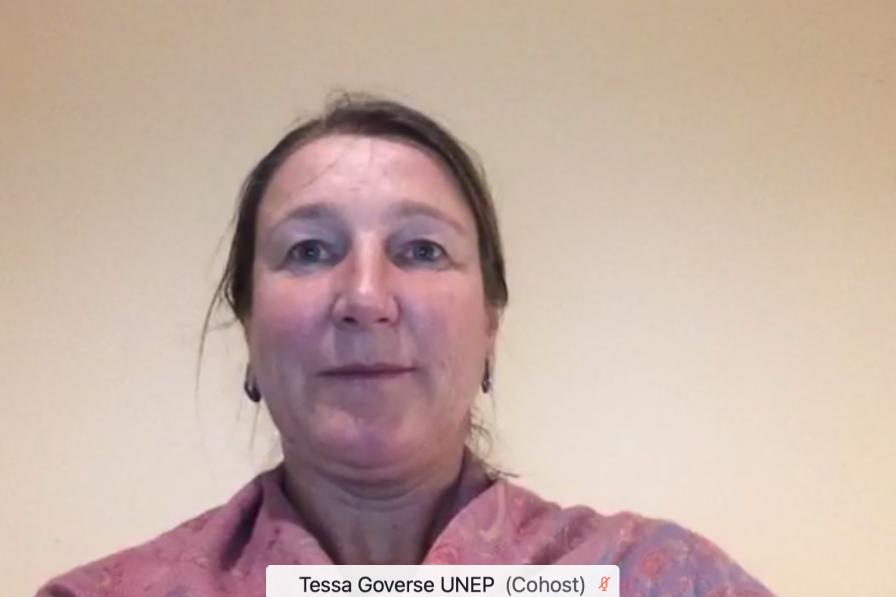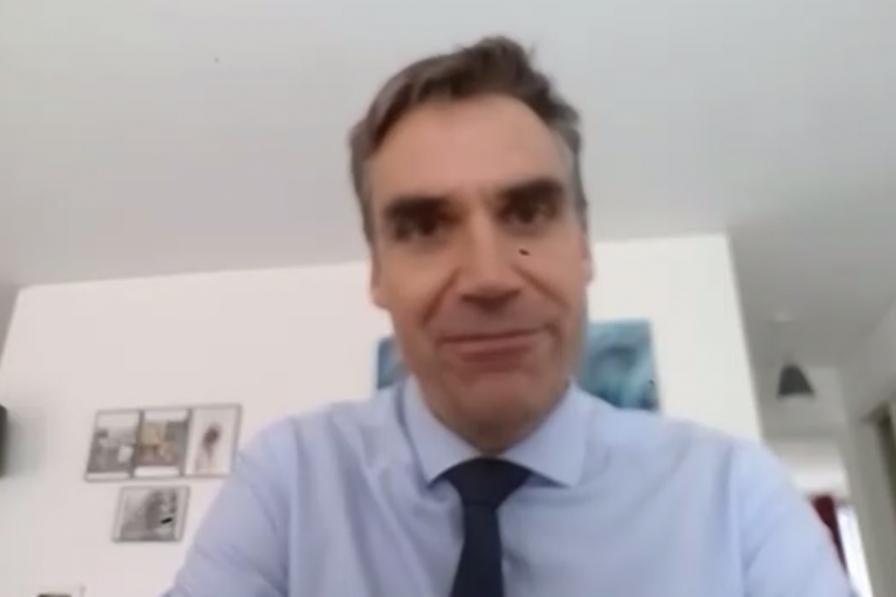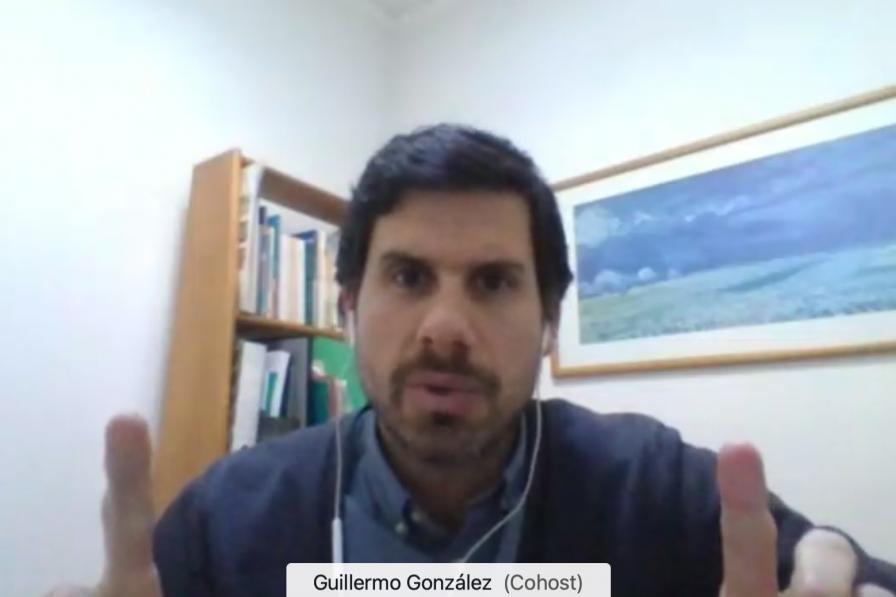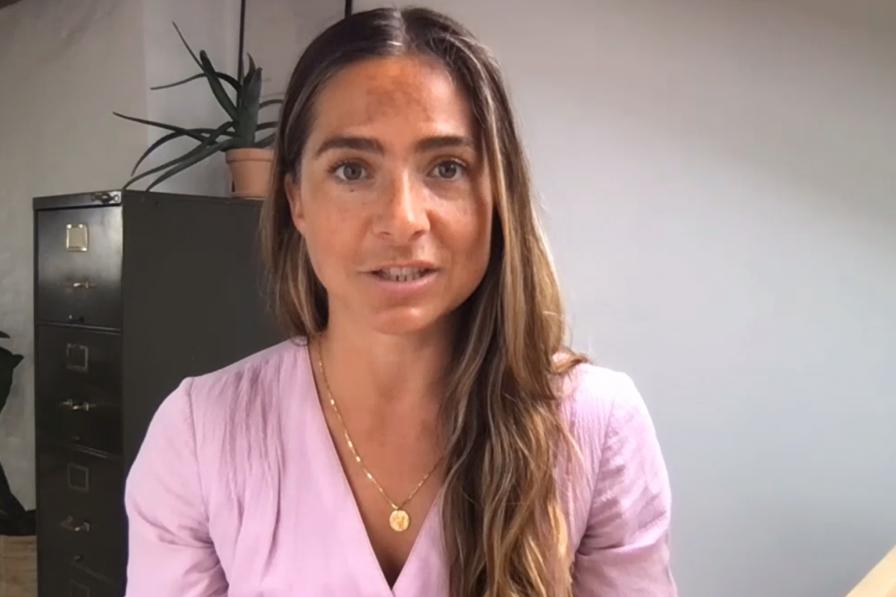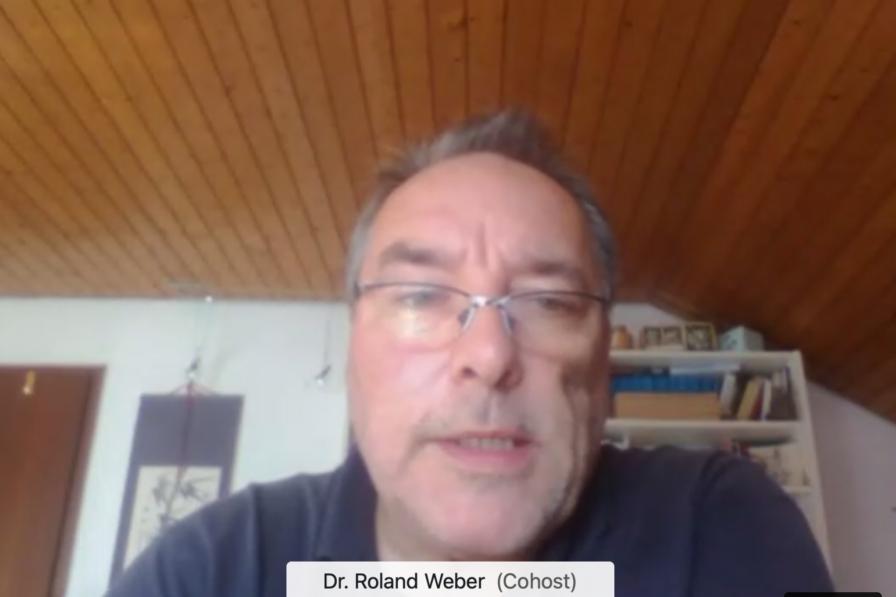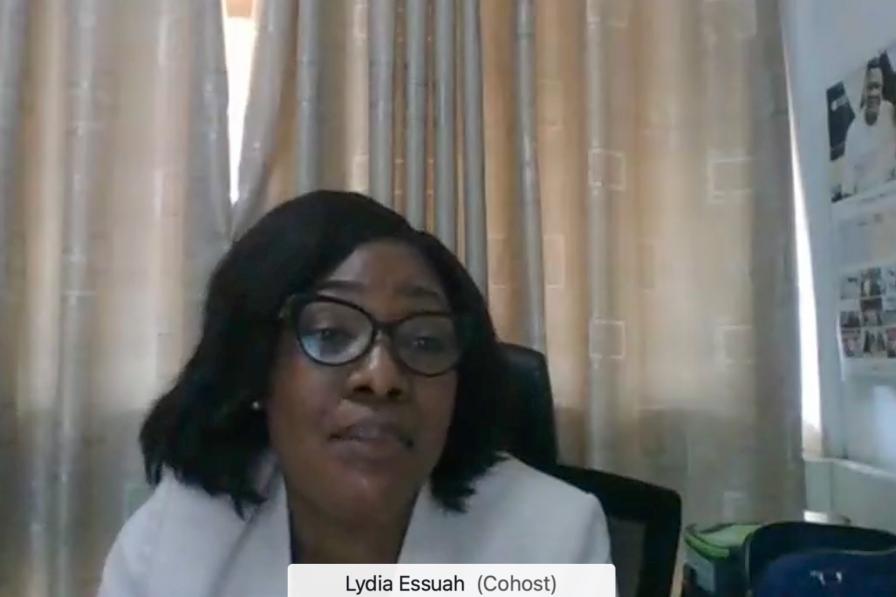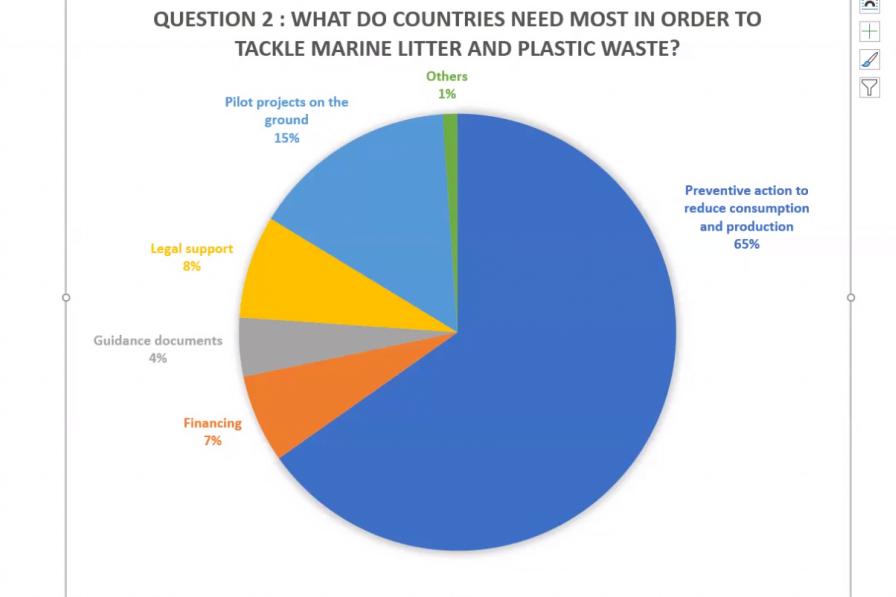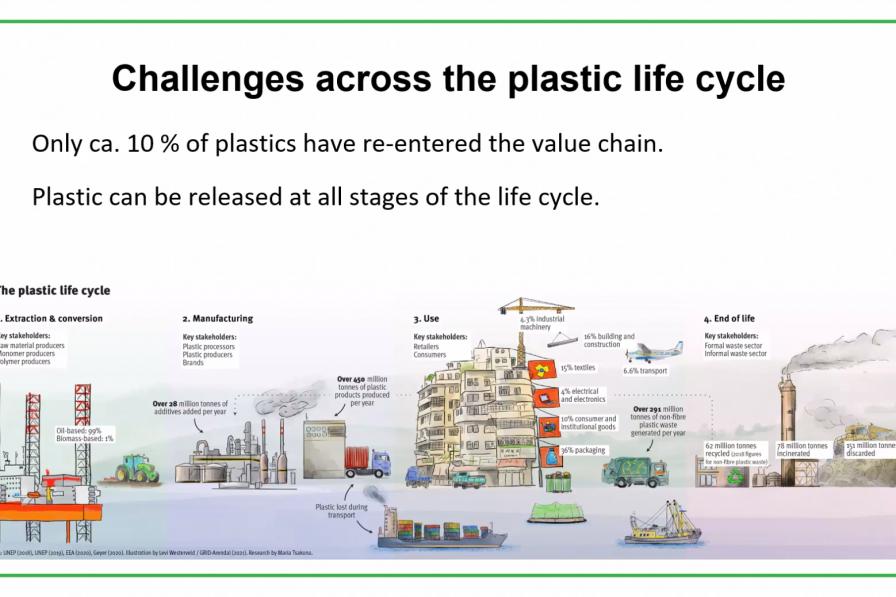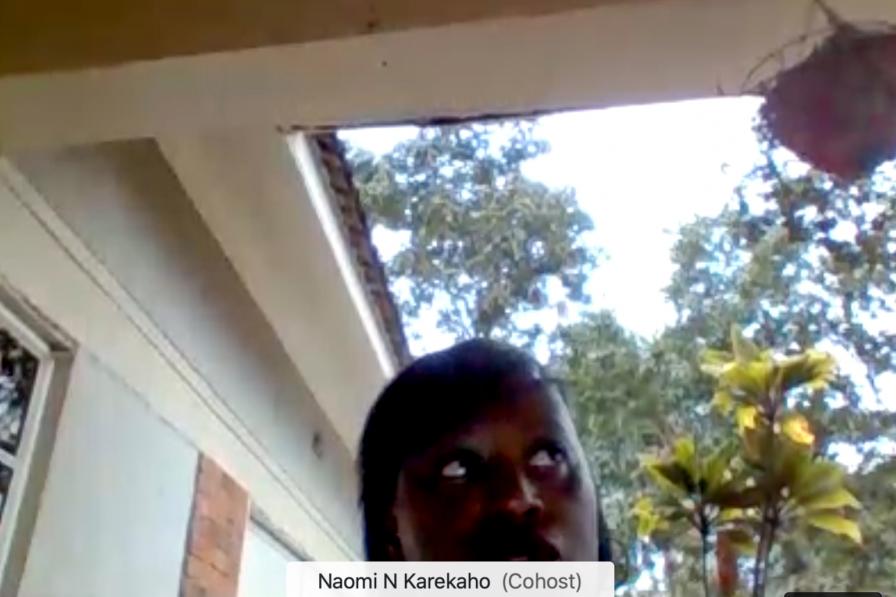This event outlined the global challenges posted by marine litter and plastic waste, highlighting the need for global, science-based solutions ranging from preventative actions to management of plastic waste. The event also addressed the particular threat of plastic wastes to mountain and ocean ecosystems. Moderated by Tessa Goverse (UN Environment Programme (UNEP)), the event was organized by UNEP, GRID-Arendal and the Basel, Rotterdam and Stockholm (BRS) Conventions Secretariat.
The event featured a preview of the organizers’ forthcoming joint publication “Drowning in Plastics – Marine Litter and Plastic Vital Waste Graphics.” Heidi Savelli-Soderberg (UNEP) explained that the purpose of this publication is to visualize complex issues related to the plastic pollution crisis. She outlined the dramatic increase in production plastics and additives, underscoring that only 10% of plastics have been recycled, 14% have been incinerated, and the rest are in landfills or the environment. On global trade, Savelli-Soderberg noted an alarming increase in plastic wastes mainly going to southeast Asia, and pointed to a significant increase in counterfeit documents and fraudulent waste registrations. She also discussed the impact of plastic pollution on human health, noting that the main route of exposure is ingestion of plastic particles that are in our food, water, and air.
Carlos Martin-Novella (Deputy Executive Secretary, BRS Conventions) underscored that plastics pollution is a multi-sector, multi-layer problem, and international policies that address the source of the problem are needed to help countries deal with this waste close to its origin. He emphasized that the Basel Convention plastic waste amendments are “low-hanging fruit” that will allow quick progress toward empowering countries to control what waste they import, and will create opportunities for sustainable and sound management of waste at the local level. He also underscored that it is not possible to regulate every aspect of this complex problem through a single global agreement, and said existing bodies such as the World Trade Organization, World Customs Organization, and Food and Agriculture Organization have a role to play in addressing the plastic pollution crisis.
Felix Wertli (Federal Office for the Environment, Switzerland) called for a strengthened global response and said Switzerland supports the call to start negotiating a global, legally-binding agreement to prevent plastic pollution. He said such a convention should cover the entire lifecycle of plastics from all sources and work collaboratively with, for example, the Basel Convention. He described the next meeting of the UN Environment Assembly, scheduled for February 2022, as a historic chance to launch a new process.
Nanette Laure (Ministry of Environment, Energy and Climate Change, Seychelles) talked about the important role of small island developing states (SIDS) in addressing marine plastics and marine litter, underscoring that SIDS do not produce plastics but must implement measures to combat plastic pollution created by imports. She highlighted several relevant actions taken by the Seychelles, including setting up a national technical unit to deal specifically with this issue, as well a ban on single use plastics. She underscored the need for technical and political support to help push forward the Seychelles’ vision for the future.
In the second part of the event, participants focused on science-based solutions, from preventative actions to plastic waste management. Savelli-Soderberg noted that only about 10% of plastic waste goes back into the value chain, and that considerable leakage occurs during the use and disposal phases of the plastics lifecycle. She highlighted that the informal sector plays a crucial role in the collection of plastic waste, and said this presents an opportunity to address environmental justice and inclusion for these workers and their families. She also emphasized that there is no silver bullet to solve the plastic pollution crisis, citing as an example several problems with so-called biodegradable plastics.
Guillermo González Caballero (Ministry of Environment, Chile) highlighted several actions Chile is taking to tackle plastic pollution, including by collaborating with the Ellen MacArthur Foundation to analyze the lifecycle of plastic products and to consider the environmental impacts of possible substitutions. He underscored that changing from one single-use product to another (e.g., from plastic to paper bags) can create other environmental problems and underscored the importance of switching to products that are reusable. He also highlighted Chile’s efforts to work with all of the actors in the value chain to devise a roadmap for tackling this complex issue.
Roland Weber (Independent Consultant) talked about chemicals in plastics, noting that over 10,000 substances are used in plastics, 2,400 of which have been identified as having hazardous properties. He called for a better lifecycle management plan to avoid recycling plastics containing, for example, persistent organic pollutants (POPs) into toys and other products. He emphasized the need to identify alternatives and, noting that over the years POPs have been substituted with other POPs, highlighted the need to avoid regrettable substitutions. He also pointed to the challenges of separating POPs-containing plastics out of the recycling waste stream, particularly in developing countries, and said this is a major barrier to achieving a more circular economy. He also noted that imposing taxes on plastics could be helpful, particularly in developing countries where waste management is both key and underfinanced.
Lydia Essuah (Ministry of Environment, Science, Technology and Innovation, Ghana) outlined her ministry’s work on marine litter and microplastics, noting its main objectives are to control transboundary movement, ensure environmentally sound management, and control and minimize production of plastic waste. She cited a successful project to collect and recycle plastic fishing nets, noting that mobile payments incentivized the fishermen to turn in their nets rather than dumping them into the sea.
In the final segment of the event, Savelli-Soderberg emphasized that certain ecosystems, including mountains and oceans, are particularly at risk from plastic pollution. She highlighted the threats posed by microplastics, which often contain a cocktail of chemical additives and are easily ingested by humans and other organisms.
Naomi Karekaho (National Environment Management Authority, Uganda) outlined her country’s work with UNEP’s Clean Seas campaign. She said that while Uganda is a land-locked country, it is also the source of the Nile and home to Lake Victoria. She said benefits of this collaboration include access to knowledge, capacity building, resource sharing, and development of a national action plan. She also said the country hopes to facilitate a move away from plastics and back to biodegradable resources, such as papyrus, that are native to Uganda.
Michael Long (Parley for the Oceans) emphasized that plastic pollution is a human problem, not an ocean problem, as humans created this material and it does not belong in nature. He underscored that how we consume has a direct impact on the environment, and said we need to understand that we are interconnected with nature.
Lesya Nikolayeva (International Environmental Expert) outlined a project focused on plastic pollution in remote and mountain areas, noting that packaging is a primary source of plastic waste and is linked with growing tourism activities. She noted that microplastics are also a “huge problem” for mountains and remote areas, citing evidence of “plastic rain” in the Rocky Mountains, Pyrenees, and Tibetan plateau near Mount Everest. She explained that developing countries have less capacity to establish functioning waste management systems, which leads to issues such as open burning and illegal dumping of waste.
In her concluding remarks, Moderator Tessa Goverse underscored the need to address the entire lifecycle of plastics in order to protect the environment and human health and called for robust, science-based action. She reminded the 170 participants that the new vital graphics previewed in the event would be published in the coming weeks.
To receive free coverage of global environmental events delivered to your inbox, subscribe to the ENB Update newsletter.
Images from the Side Event
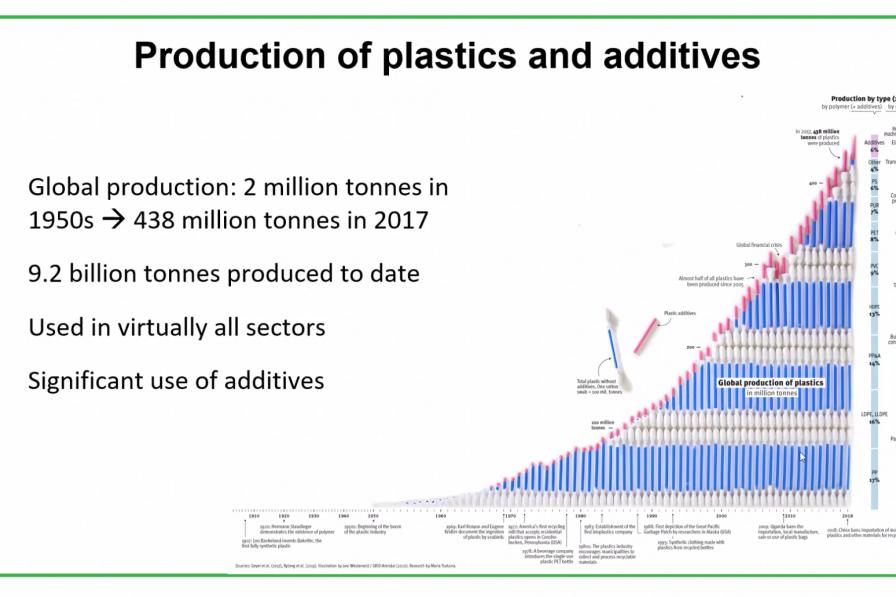
A slide presented during the side event shows how plastic production has increased dramatically in recent years.
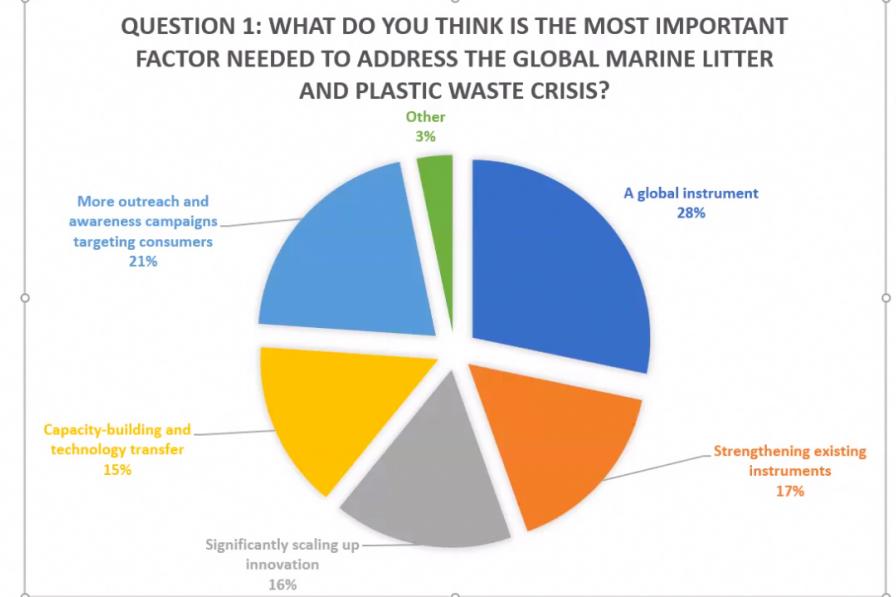
The results of a poll held during the first panel that asked what the most important factor was for addressing the global plastics and marine litter problem.
